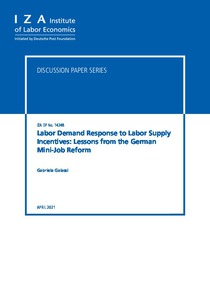Labor demand response to labor supply incentives: Lessons from the German mini-job reform

Institute of Labor Economics, Bonn
IZA - Bonn
2021
low wages ; employment policy ; working poor ; tax incentive ; enterprise level ; labour market reform
Discussion Paper
14248
Labour market
English
Bibliogr.
"This paper analyzes how firms respond to changes in tax benefits for low-earning workers and how such policies also affect high-earning workers. I explore establishment outcomes around Germany's 2003 Mini-Job Reform, which expanded tax benefits for low-earning workers. I document that highly exposed establishments–high proportion of low-earning workers–increase their employees relative to non-exposed establishments–low proportion of such workers. This relative expansion is tilted towards high-earning workers, not targeted by the tax benefits. Nonexposed establishments substitute employment towards low-earning workers without expanding at the same pace. My findings are consistent with a model in which employment growth the policy intended is accompanied by a reallocation of employment and production between highly exposed firms and non-exposed firms, resulting in an efficiency loss."
Digital
The ETUI is co-funded by the European Union. Views and opinions expressed are however those of the author(s) only and do not necessarily reflect those of the European Union or the ETUI.